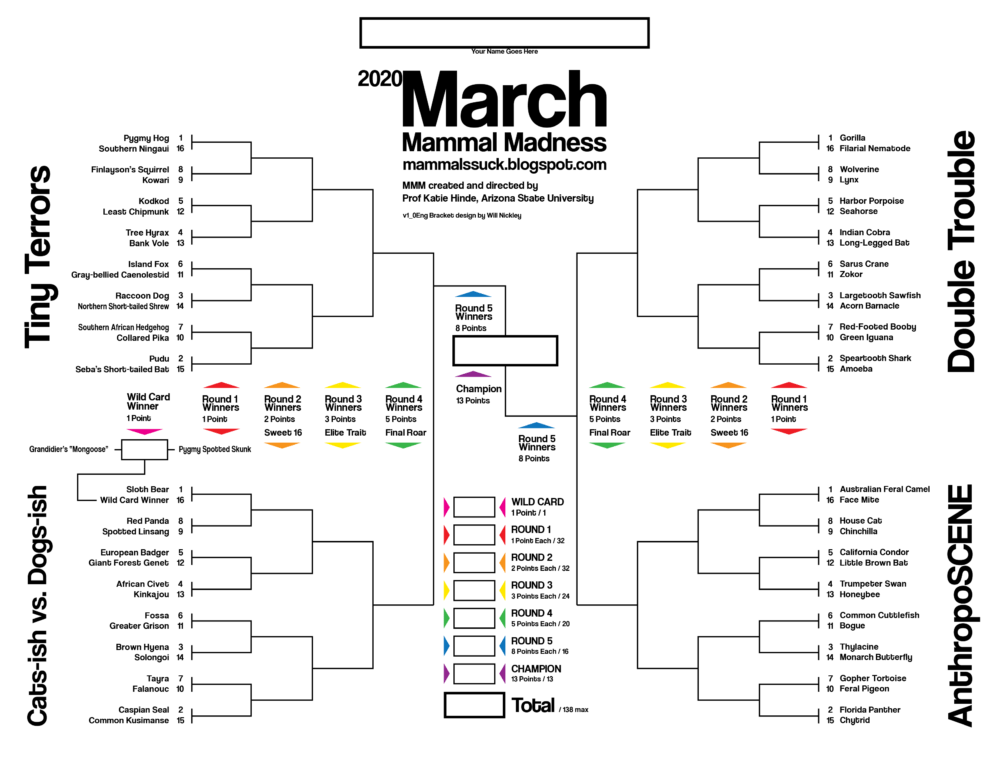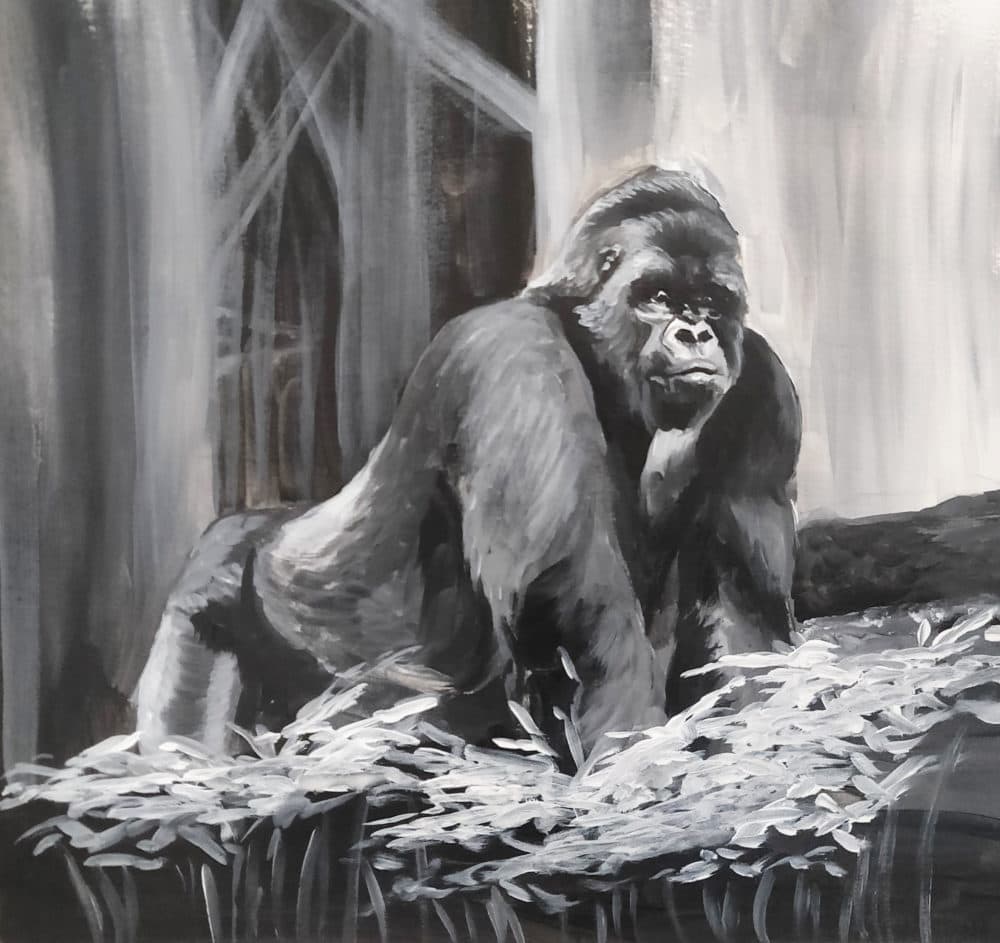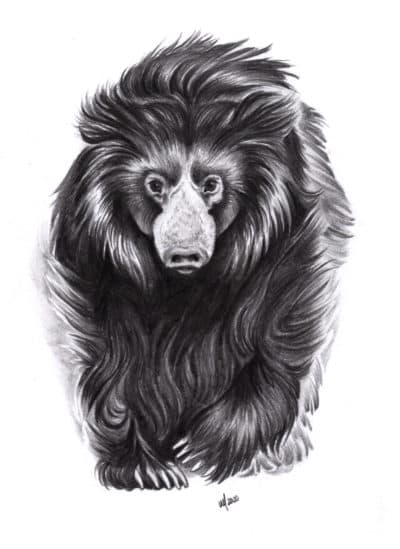Advertisement
Missing The NCAA Tourneys? Try March Mammal Madness
Resume
Are you finding yourself with too much time on your hands in the absence of March Madness? Us too. So if you’re still looking for your annual fix of brackets and alliteration, we’ve got just the thing for you:
It's March Mammal Madness!
To explain, we're joined by Arizona State University professor of evolutionary biology and senior sustainability scientist Katie Hinde.
KG: So I want to start back in 2013, otherwise known as the "Golden Age of the BuzzFeed Quiz." Please tell me what you were teaching back then and how BuzzFeed enters this story.
KH: I was teaching a class on building babies, because I study maternal and child health. And as a lab camaraderie-building exercise, I had encountered on social media a BuzzFeed animal March Madness, and I'd printed it out and I distributed it out to members of my lab, and we started to fill it out. And the bracket was 16 animal species, and it was based on which one was cutest.

And I remember grabbing the brackets back from them and being like, "This is no good," because the NCAA March Madness experience is so exciting. It's 64 teams, and so I was really dissatisfied by this kind of shallow treatment of it. And I was like, "We're gonna do this differently. Give me an hour."
KG: So what did you decide to do?
KH: In that hour, I put together a 65-animal bracket, so I created a wild card to see who would get to get a bid into the show. Running away was a forfeit — it didn't have to be a bloody battle between these two animals. A lot of encounters among animals in the wild are very boring. And [I] basically used what we know about these animals to talk about what would happen if they were to encounter each other. And I created certain rules: whatever the better-seeded species was, for the first three rounds, they got home habitat advantage. It was all based on what we know empirically. In these battles, I would take that science and turn it into a story.
[I] put it together and handed it out to my lab, handed it out to some colleagues, and then I put it on my blog and talked about it on Twitter. I made jokes about there being a — instead of an "Elite Eight," it was an "Elite Trait." Instead of a "Final Four," it was a "Final Roar."
KG: And what was the reaction to all of this?
KH: There was a lot of people that just were having a lot of fun with it. And part of it, it stretched across our spring break. And I was in South Africa in the Kalahari, doing some pilot work on a potential research project. And so, because of the time difference and how slow the internet was, I would wait until the middle of the night, put together these quick little battles, tweet them in the middle of the night and then have to get up the next day and run around chasing meerkats.
And it was pretty hilarious. The championship that year was between African elephant and warthog. So at the end of every one was like, "That was awesome. See you in 2014."

KG: So this is now the eighth year of March Mammal Madness. Twenty-two thousand people now follow the tournament on Twitter — and that number seems to be growing by the day.
Some of your followers have filled out brackets, just like you would for the NCAA basketball tournament. But instead of having, say, Michigan State going all the way, they might have Caspian Seal. And there's an element of chance to this, just like there's an element of chance to March Madness, right?
KH: We do insert an element of chance because those upsets are so incredible in sport events. And so what we do with the species — the organizing team behind the scenes, we do a selection Sunday. And we have the species that we've selected for that year — it changes year to year as a chance to kind of showcase the breadth of the natural world — and we rank them a lot based on their weight, but with the expectation that predators tend to punch above their weight.
Using what we know about their weaponry, their armor, their defense styles, their ambush or attack tactics, we do a kind of rough probability of what we expect the outcome to be. And then we use a random number generator to determine what the outcome actually is. And then what we do is, when there's an unexpected outcome, we go into the literature, the academic scientific literature, and we find some kind of plausible explanation for this outcome.

KG: So one thing people like to say during March Madness is this idea of "survive and advance." And that's sort of seems like a mantra for evolutionary biology, too.
KH: So, you know, in evolutionary biology, it's really about — sorry, I'm gonna just nerd out here for a second because it's not about survival, I'm sorry.
KG: Nerd all you want.
KH: OK, so natural selection is acting on organisms relative to how many copies of their genes get into the next generation. So it's largely a selection on reproductive outcome. But in order to reproduce, you generally have to survive. And so, in that sense, we are highlighting key adaptations and traits in these animals that are something that are likely to be important for them to survive.
Now, sometimes survival means being really good at attack. Sometimes it's really good about being able to defend. And sometimes he who runs away survives to reproduce a later day.
KG: Well, so as you suggest, not every single one of these matchups is going to be a thriller. Could you tell me about — there's apparently a famous matchup from a couple of years ago. And you're gonna have to help me with this. The "dhole" and the "binturong"?
KH: Yeah. So that that division was called the "Who and the What Now?" And it was a whole bunch of species that we figured most people wouldn't know about.
So we had the dhole, which is a canid. It's a wolf-like species in Asia. And it had to fight a binturong, which is a relative of the weasel, that, fun fact, smells like Fritos or popcorn, depending on your exact sense of smell.
The binturong eats a lot of fruit. They particularly like figs. And it was going up against a clear carnivore, a predator. So most people would have predicted that the dhole, the dog relative, would have won. But at the time, because we craft these stories, there can be things that happen in previous rounds that carry forward and have an impact on how a species performs in the tournament. And the day before...
We know how long it takes the dhole to digest from a really big meal.
And so in this encounter, the dhole, being completely full, had very little motivation to want to fight a binturong.
So the binturoung ended up continuing to do its thing. And the dhole just went about its way, forfeiting the field of battle.

KG: This year’s tournament is already underway. Has the random number generator already told you who’s going to win? I mean, if I paid you a whole bunch of money would you tell me who’s gonna come out on top?
KH: Nobody has yet offered me the amount of chocolate it would take to reveal that.
KG: So how has the canceling of the basketball tournaments affected your event, if at all? Have you suddenly gotten a lot more interest?
KH: We have seen more activity on Twitter of bracket addicts. We're seeing a lot of parents whose kids are now not going into school because of the current pandemic crisis. We're seeing a lot of parents jump on board. And we're seeing a lot more discussion, everybody being dispersed, but showing up together in these online spaces to celebrate and cheer.
You know, the series of bouts, the play-by-play, it's a couple hours of activity. And so it has that same kind of jumping up and down, screaming, fury, joy that you get from watching a really exciting sports event.
KG: So, if you were to have a message to basketball fans who are disappointed by the cancelation of March Madness, what would that be?
KH: People that are sad to be missing out on their usual celebrations: I share those griefs. We're all experiencing it. And, you know, this is what it takes. But everybody is welcome to come to our virtual coliseum for animal encounters. We welcome people to come and spend a few weeks celebrating science.
Katie Hinde is a professor of evolutionary biology and senior sustainability scientist at Arizona State University. It’s not too late to fill out your brackets for March Mammal Madness 2020.
This segment aired on March 21, 2020.
